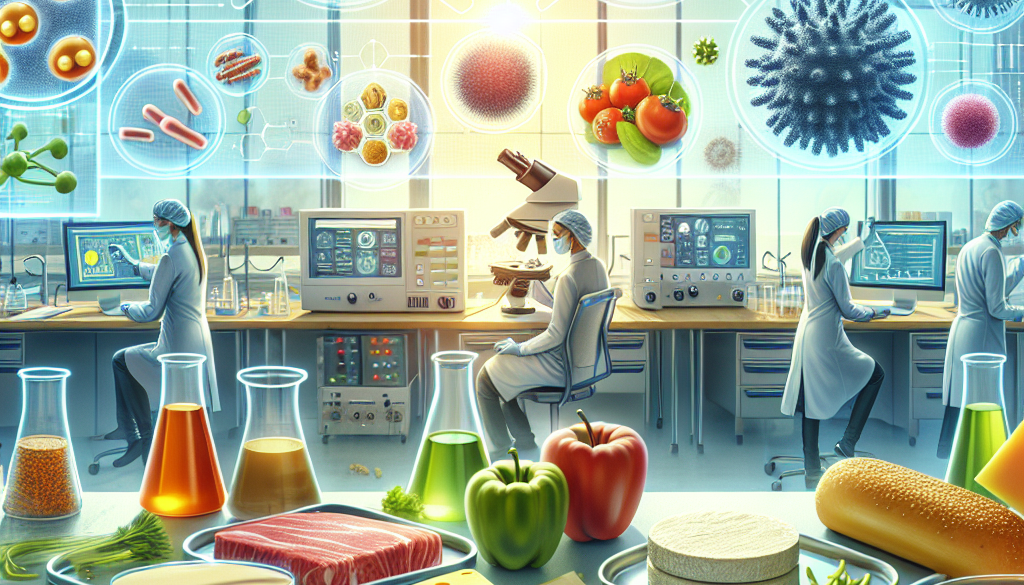Advances in Microbiological Testing for Food Safety
-
Table of Contents
- Advances in Microbiological Testing for Ensuring Food Safety
- Emerging Technologies in Microbiological Testing
- Improvements in Sample Preparation and Handling
- Integration of Rapid Testing Methods
- Regulatory and Industry Impacts
- Challenges and Future Directions
- Conclusion
- ETprotein: Your Partner in Food Safety
Advances in Microbiological Testing for Ensuring Food Safety

Food safety is a paramount concern for consumers, producers, and regulatory bodies worldwide. The presence of pathogenic microorganisms in food can lead to foodborne illnesses, which can have severe health consequences. As a result, the food industry is continually seeking improved methods for detecting and controlling harmful microbes. Advances in microbiological testing play a crucial role in ensuring the safety and quality of our food supply. This article explores the latest developments in this field and their impact on public health.
Emerging Technologies in Microbiological Testing
Recent technological advancements have revolutionized the way food safety testing is conducted. These innovations offer faster, more accurate, and more efficient detection of pathogens.
- Next-Generation Sequencing (NGS): NGS technologies allow for the rapid sequencing of DNA, providing detailed information about the genetic makeup of microorganisms. This helps in identifying and tracking foodborne pathogens with unprecedented precision.
- PCR-based Methods: Polymerase Chain Reaction (PCR) techniques have become more sophisticated, enabling the detection of minute amounts of microbial DNA in food samples. Real-time PCR, in particular, offers rapid results and high specificity.
- Biosensors: The development of biosensors, which combine biological components with a physicochemical detector, has been a game-changer. These devices can detect specific bacteria or toxins quickly and are becoming increasingly portable and user-friendly.
- Whole Genome Mapping: This technique provides a complete genetic fingerprint of a microorganism, allowing for more effective tracking of contamination sources and outbreak management.
Improvements in Sample Preparation and Handling
Advances in sample preparation and handling are also enhancing the effectiveness of microbiological testing. Automation and miniaturization of sample processing reduce the risk of human error and contamination, while also speeding up the testing process.
- Automated Liquid Handling: Automated systems for liquid handling minimize manual intervention, thereby increasing throughput and reproducibility of tests.
- Microfluidics: Microfluidic devices enable the manipulation of small volumes of fluids, allowing for the integration of multiple laboratory functions into a single chip.
Integration of Rapid Testing Methods
Rapid testing methods are being integrated into routine food safety protocols to provide quicker results. These methods reduce the time required to detect and respond to potential microbial contamination.
- Immunoassays: Techniques such as enzyme-linked immunosorbent assays (ELISAs) are widely used for the rapid detection of foodborne pathogens and toxins.
- Lateral Flow Assays: These assays are simple, cost-effective, and can be used on-site for immediate results. They are particularly useful for screening large numbers of samples.
Regulatory and Industry Impacts
The implementation of advanced microbiological testing methods has significant implications for regulatory standards and industry practices.
- Enhanced Regulatory Compliance: With more sensitive and accurate testing methods, food producers can better comply with stringent regulatory requirements, reducing the risk of recalls and protecting public health.
- Improved Quality Control: Advanced testing allows for more comprehensive monitoring of the production environment, leading to improved product quality and consistency.
- Supply Chain Transparency: The ability to trace pathogens back to their source enhances transparency and accountability throughout the supply chain.
Challenges and Future Directions
Despite the progress made, challenges remain in the field of microbiological testing. The need for skilled personnel, high costs of advanced technologies, and the complexity of interpreting results are some of the hurdles that need to be addressed. Looking ahead, the future of microbiological testing lies in the integration of artificial intelligence and machine learning to further enhance the speed and accuracy of pathogen detection.
Conclusion
The advances in microbiological testing for food safety are transforming the industry, offering more reliable and efficient ways to ensure the safety of our food. From next-generation sequencing to rapid on-site assays, these technologies are setting new standards in food safety and quality. As these methods continue to evolve, they will play a critical role in safeguarding public health and maintaining consumer confidence in the food supply.
ETprotein: Your Partner in Food Safety
In light of the importance of food safety, ETprotein company’s protein products stand out as a reliable choice for the food industry. Their commitment to quality and safety is evident in their range of organic bulk vegan proteins and L-(+)-Ergothioneine (EGT) products. With a focus on non-GMO, allergen-free attributes, and high purity levels, ETprotein’s offerings are an excellent addition to any food safety-conscious producer’s inventory.
About ETprotein:
ETprotein, a reputable protein and L-(+)-Ergothioneine (EGT) Chinese factory manufacturer and supplier, is renowned for producing, stocking, exporting, and delivering the highest quality organic bulk vegan proteins and L-(+)-Ergothioneine. They include Organic rice protein, clear rice protein, pea protein, clear pea protein, watermelon seed protein, pumpkin seed protein, sunflower seed protein, mung bean protein, peanut protein, and L-(+)-Ergothioneine EGT Pharmaceutical grade, L-(+)-Ergothioneine EGT food grade, L-(+)-Ergothioneine EGT cosmetic grade, L-(+)-Ergothioneine EGT reference grade and L-(+)-Ergothioneine EGT standard. Their offerings, characterized by a neutral taste, non-GMO, allergen-free attributes, with L-(+)-Ergothioneine purity over 98%, 99%, cater to a diverse range of industries. They serve nutraceutical, pharmaceutical, cosmeceutical, veterinary, as well as food and beverage finished product distributors, traders, and manufacturers across Europe, USA, Canada, Australia, Thailand, Japan, Korea, Brazil, and Chile, among others.
ETprotein specialization includes exporting and delivering tailor-made protein powder and finished nutritional supplements. Their extensive product range covers sectors like Food and Beverage, Sports Nutrition, Weight Management, Dietary Supplements, Health and Wellness Products, and Infant Formula, ensuring comprehensive solutions to meet all your protein needs.
As a trusted company by leading global food and beverage brands and Fortune 500 companies, ETprotein reinforces China’s reputation in the global arena. For more information or to sample their products, please contact them and email sales(at)ETprotein.com today.












